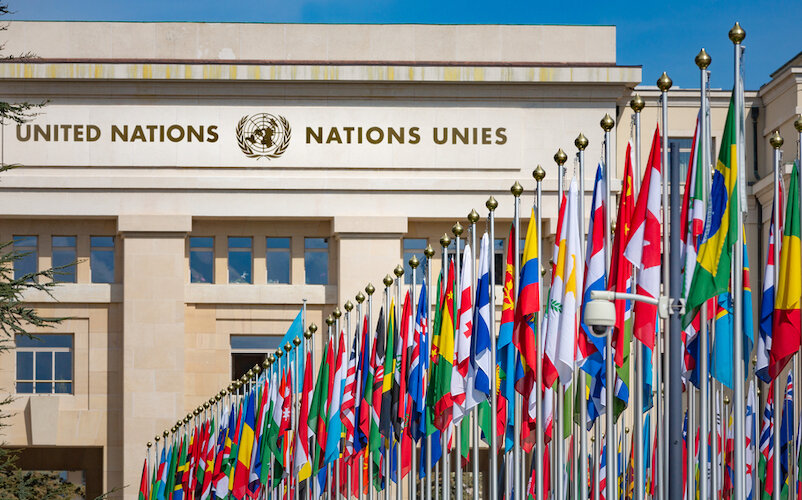(LifeSiteNews) — Over the past several years, conservatives and Christians have become increasingly aware of the power of globalist institutions and the top-down agenda imposed from places like New York, Brussels, and Strasbourg. International organizations largely captured by the global LGBT movement and abortion movement are making consequential decisions that override national sovereignty and have a profound effect on laws in countries that still oppose the radical progressive agenda.
I have interviewed Austin Ruse of C-Fam for LSN several times over the past few years on this subject – his analysis of the impact of international institutions is well worth listening to. Ruse notes that these institutions swarm with progressive NGOs working day and night to insert language on LGBT issues and “reproductive rights” (abortion) into international agreements of every kind, from treaties to human rights agreements. Only a handful of Christian groups are present to combat them – groups like Ruse’s Center for Family and Human Rights and Christian Council International, to name two.
But those organizations punch well above their weight. It can be depressing to consider the power wielded by globalist organizations, and often Christians tend towards despair or cynicism when considering the David and Goliath nature of the contest. But despite that, these Christian groups consistently manage to make a tremendous impact (in our conversation, Ruse described how their lobbying had kept the UN from recognizing abortion as an international “human right” for decades).
C-Fam reported another such victory on May 3 that is well worth taking note of. “Traditional countries blocked any mention of abortion and homosexual/transgender issues in a political declaration adopted by the UN Commission on Population and Development this week,” reported Stefano Gennarini. “In a major setback to Western countries, the declaration to mark the thirtieth anniversary of the landmark UN Conference on Population and Development held at Cairo in 1994 does not even contain euphemisms for abortion and homosexual/trans policies like the term ‘sexual and reproductive health’ and language about ‘intersectionality.’”
READ: Abortion killed 44.6 million people worldwide in 2023, more than any other cause of death
The negotiations over the declaration at the UN Commission on Population and Development last week were reportedly “hot” and “tense.” As C-Farm noted:
From the outset, the Honduran Ambassador to the United Nations, Noemí Espinoza Madrid, attempted to bypass paragraph by paragraph negotiations, as is customary in intergovernmental processes. This was made worse by the fact that her proposed agreement emphasized sexual and reproductive health multiple times but did not focus on the priorities of many traditional countries, specifically, the family, poverty, and the right to development. Western governments could not risk another failure to reach an agreement at the Commission on Population and Development. Seven of the last ten sessions of the annual commission have failed to produce an agreement after negotiations collapsed over these very issues.
In the end, traditional countries convinced other UN member states to adopt a short procedural document that does not mention sexual policies at all. The setback for Western countries is compounded by the fact that the declaration does not expressly commit countries to the 1994 Cairo agreement past the year 2030, as they wanted. The UN system is already debating the UN development goals that will replace the current ones in 2030.
C-Fam also noted that the debate continued after the declaration was adopted, with delegates from Africa and the Middle East complaining (once again) about the Western fixation on “sexual policies” and “emphasized the importance of policies to eradicate poverty, protection of the family, as well as respect for sovereignty, culture, and religion.” Delegates from Western countries, conversely, called the declaration they reluctantly signed on to a “minimalist” approach, with American officials and others stating that they will continue to focus on abortion and LGBT ideology.
As HHS Deputy Assistant Secretary for Population Affairs Jessica Marcella claimed in the Biden administration’s official statement to the commission that “maternal health,” contraception, and so-called “safe abortion” are “inextricably linked.” In short: You don’t get foreign aid for maternal healthcare unless you accept abortion and birth control, as well. Marcella called this a “whole-of-government approach” to pushing abortion abroad and condemned “setbacks” to the global abortion and LGBT agenda internationally.
READ: Study finds 6 in 10 women who had chemical abortions wanted help or emotional support after
Interestingly, C-Fam views the intensity of this debate as good news. “The debates about the declaration for the 30th anniversary of the Cairo conference proves that [abortion] and gender policies are more controversial today than in 1994,” Stefano Gennarini writes. “This is largely because Western countries and organizations they fund are no longer coy about what these policies mean. When Western countries and UN agencies first began to promote terms like ‘gender’ and ‘sexual and reproductive health’ thirty years ago, the terms were new and no one understood them.”
That is no longer the case. The global abortion and LGBT agenda is crystal clear, and the battle has been joined. It is still a fight between David and Goliath – but as last week proved, the outcome is by no means pre-determined.





